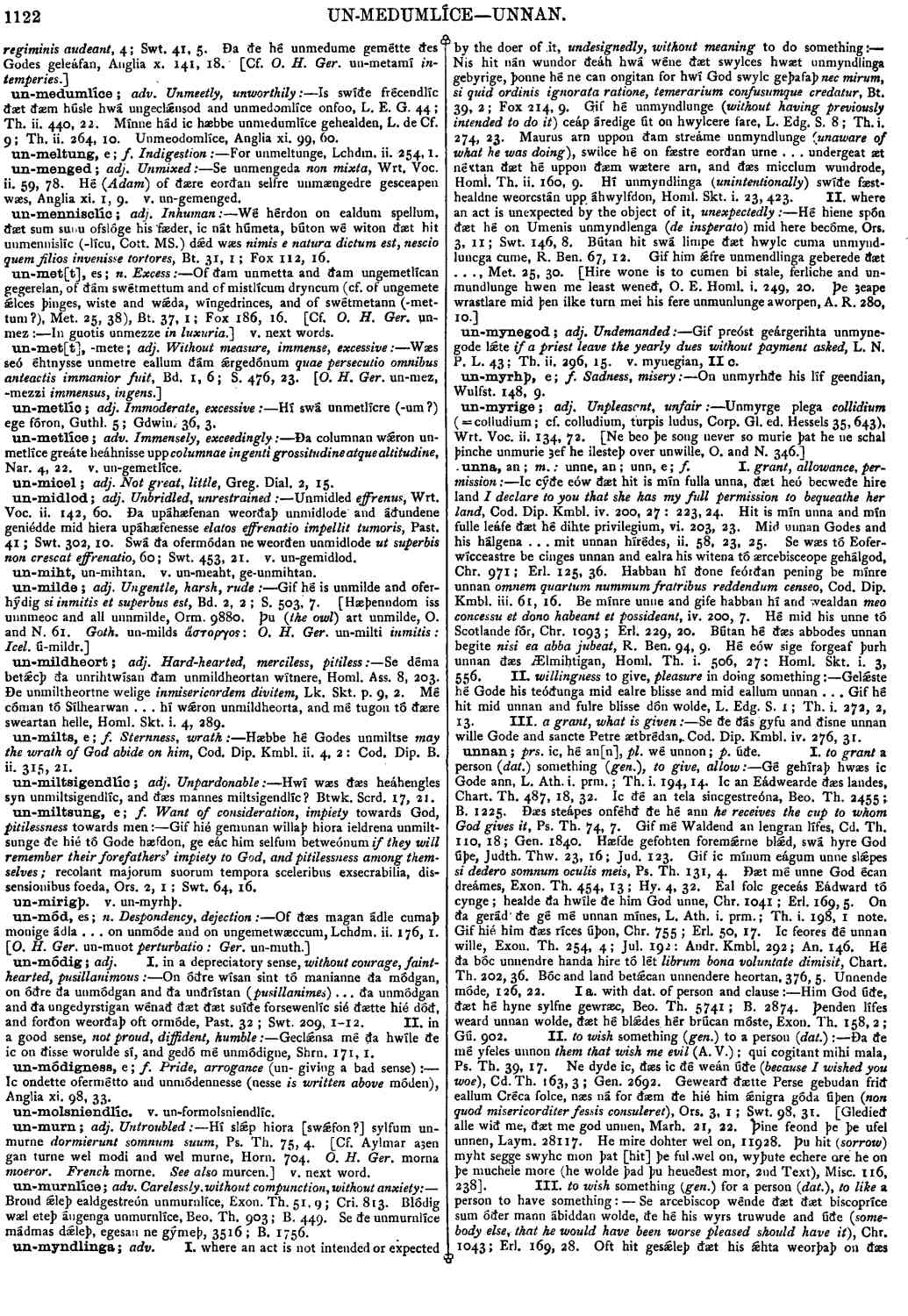unnan
- verb [ preterite-present ]
-
Gé gehíraþ hwæs ic Gode ann,
- L. Ath. i. prm. ;
- Th. i. 194, 14.
-
Ic an Eádwearde ðæs landes,
- Chart. Th. 487, 18, 32.
-
Ic ðé an tela sincgestreóna,
- Beo. Th. 2455 ;
- B. 1225.
-
Ðæs steápes onféhð ðe hé ann
he receives the cup to whom God gives it,
- Ps. Th. 74, 7.
-
Gif mé Waldend an lengran lífes,
- Cd. Th. 110, 18 ;
- Gen. 1840.
-
Hæfde gefohten foremǽrne blǽd, swá hyre God úþe,
- Judth. Thw. 23, 16 ;
- Jud. 123.
-
Gif ic mínum eágum unne slǽpes
si dedero somnum oculis meis,
- Ps. Th. 131, 4.
-
Ðæt mé unne God écan dreámes,
- Exon. Th. 454, 13 ;
- Hy. 4, 32.
-
Eal folc geceás Eádward tó cynge; healde ða hwíle ðe him God unne,
- Chr. 1041 ;
- Erl. 169, 5.
-
On ða gerád ðe gé mé unnan mínes,
- L. Ath. i. prm. ;
- Th. i. 198, 1 note.
-
Gif hié him ðæs ríces úþon,
- Chr. 755 ;
- Erl. 50, 17.
-
Ic feores ðé unnan wille,
- Exon. Th. 254, 4 ;
- Jul. 192: Andr. Kmbl, 292 ;
- An. 146.
-
Hé ða bóc unnendre handa hire tó lét
librum bona voluntate dimisit,
- Chart. Th. 202, 36.
-
Bóc and land betǽcan unnendere heortan,
- 376, 5.
-
Unnende móde,
- 126, 22.
-
--- Þenden lífes weard unnan wolde, ðæt hé blǽdes hér brúcan móste,
- Exon. Th. 158, 2 ;
- Gú. 902.
-
Ða ðe mé yfeles unnon
them that wish me evil (A. V.);
qui cogitant mihi mala,
- Ps. Th. 39, 17.
-
Ne dyde ic, ðæs ic ðé weán úðe (
because I wished you woe
),- Cd. Th. 163, 3 ;
- Gen. 2692.
-
Gewearð ðætte Perse gebudan frið eallum Créca folce, næs ná for ðæm ðe hié him ǽnigra góda úþen (
non quod misericorditer fessis consuleret
),- Ors. 3, 1 ;
- Swt. 98, 31.
- Marh. 21, 22.
- Laym. 28117.
- 11928
- Misc. 116, 238
-
Se arcebiscop wénde ðæt ðæt biscopríce sum óðer mann ábiddan wolde, ðe hé his wyrs truwude and úðe (
somebody else, that he would have been worse pleased should have it
),- Chr. 1043 ;
- Erl. 169, 28.
-
Oft hit gesǽleþ ðæt his ǽhta weorþaþ on ðæsonwealde ðe hé ǽr on his lífe wyrrest úþe
it often happens that his property gets into the power of the man that when alive he would have been least pleased should have it,
- Blickl. Homl. 195. 4.
-
-- Ðæt is, ðæt hwá fare mid his móde æfter his niéhstan, and him unne ðæt hé tó ryhte gecierre
that is, that a man go in spirit after his neighbour, and be glad that he turn to right,
- Past. 46 ;
- Swt. 349. 14.
-
Hé ne úþe, ðæt ǽnig óþer man mǽrða má gehédde ðonne hé sylfa,
- Beo. Th. 1010 ;
- B. 503.
-
Úþe ic swíþor ðæt ðú hine selfne geseón móste
I should have been much better pleased, that you could have seen the creature himself,
- 1925 ;
- B. 960.
-
Ne meahte hé, ðeáh hé úðe wel, on ðam frumgáre feorh gehealdan
he could not keep life in the prince, though he would have been well pleased to do it,
- 5703 ;
- B. 2855.
- Kath. 1744.
Bosworth, Joseph. “unnan.” In An Anglo-Saxon Dictionary Online, edited by Thomas Northcote Toller, Christ Sean, and Ondřej Tichy. Prague: Faculty of Arts, Charles University, 2014. https://bosworthtoller.com/33569.
Checked: 1